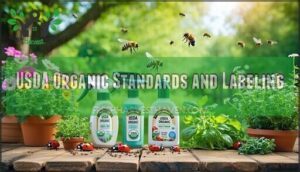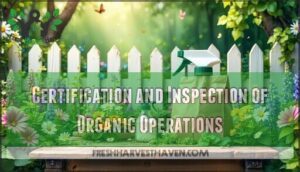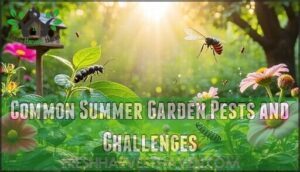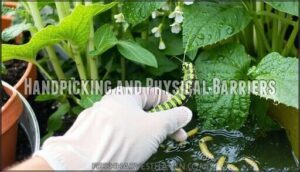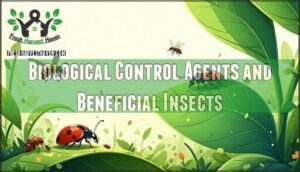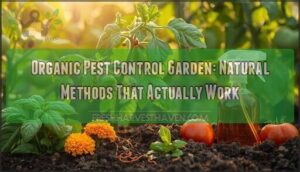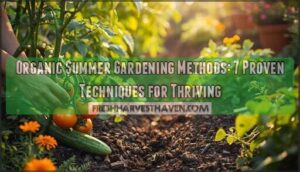This site is supported by our readers. We may earn a commission, at no cost to you, if you purchase through links.
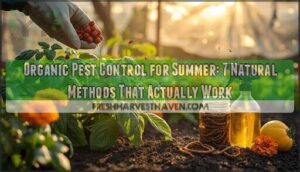
Start with handpicking larger pests like hornworms – it’s surprisingly satisfying! Deploy beneficial insects like ladybugs and lacewings as your personal pest patrol. Spray neem oil or BT for stubborn aphids and caterpillars.
Plant companion crops like marigolds and basil to create natural barriers. Physical defenses like row covers protect vulnerable seedlings from flying invaders.
The secret isn’t just what you spray, but when you strike and how you build garden-wide defenses.
Table Of Contents
- Key Takeaways
- Key Principles of Organic Pest Control
- Common Summer Garden Pests and Challenges
- Effective Organic Pest Control Methods
- Sustainable Strategies for Healthy Summer Gardens
- Practical Tips and DIY Solutions for Gardeners
- Frequently Asked Questions (FAQs)
- How to get rid of pests organically?
- What do organic farmers use to keep bugs away?
- What is the most effective organic pesticide?
- Does organic pest control really work?
- What are the disadvantages of organic pest control?
- Does spraying vinegar on plants keep bugs away?
- What keeps bugs away in the summer?
- What do organic farmers use for pest control?
- What is the best organic pest control?
- What is the most environmentally friendly method for controlling pests?
- Conclusion
Key Takeaways
- Partner with nature instead of fighting it – Use beneficial insects like ladybugs and lacewings as your personal pest patrol, and plant companion crops like marigolds and basil to create natural barriers that work 24/7.
- Time your strikes for maximum impact – Handpick larger pests like hornworms during morning garden walks when they’re most visible, and apply organic sprays like neem oil or BT when pest populations are just starting to build.
- Build garden-wide defenses with physical barriers – Deploy row covers to protect vulnerable seedlings from flying invaders, and use multiple protection methods together rather than relying on a single approach.
- Focus on soil health and ecosystem balance – Rotate crops each season to break pest cycles, encourage biodiversity with native flowers, and skip harsh chemicals that harm the beneficial insects you need for natural pest control.
Key Principles of Organic Pest Control
When you’re fighting garden pests this summer, think of organic pest control as working with nature instead of against it—you’ll skip harsh chemicals and focus on building healthy soil and strong plants that can naturally resist bugs.
The key is timing your defenses right, using certified organic methods that protect both your plants and the beneficial insects that actually help your garden thrive.
USDA Organic Standards and Labeling
Understanding organic labeling starts with the USDA’s green stamp of approval. When you’re shopping for eco-friendly pest control products, that familiar USDA Organic Seal means the item meets strict sustainable practices—no synthetic pesticides or GMOs allowed.
For organic pest control enthusiasts, this certification isn’t just bureaucratic paperwork; it’s your guarantee that natural pest control methods won’t compromise your garden’s integrity or your family’s safety.
Certification and Inspection of Organic Operations
When you’re shopping for organic pest control products, you’ll want to understand what keeps these certifications legitimate.
Farm Inspections happen annually. USDA-accredited certifiers check every detail of operations.
Organic Audits include surprise visits and testing to catch rule-breakers.
Regulatory Compliance requires detailed record-keeping of all products bought, sold, and used.
All of these checks work together so you can trust that your organic pesticides actually meet the standards they claim.
Organic Vs. Conventional Pest Management
When dealing with summer pests, you’ve got two main routes: organic pest control or going the conventional route. The organic approach has real advantages—it protects the good bugs while using earth-friendly solutions like neem oil and integrated pest management.
The conventional route? It’s all about synthetic chemicals that can mess with your garden’s natural balance.
Natural pest control and organic pesticides help you garden sustainably, cutting down on environmental damage while keeping your plants thriving. The smart move is picking methods that work alongside nature instead of fighting it.
Common Summer Garden Pests and Challenges
Summer heat turns your garden into a bug buffet, and you’ll face aphids, spider mites, whiteflies, and caterpillars that multiply faster than you can say "pesticide."
High humidity and warm temperatures create perfect conditions for these pests to thrive, making early identification and natural intervention your best defense against a full-scale garden invasion.
Identifying Insect Pests in Warm Weather
Summer pest identification starts with knowing your enemies. When warm weather hits, you’ll want to scout your garden regularly for these sneaky invaders. Summertime is insect time! As our days warm up, so do our insect populations. Smart insect monitoring helps you catch seasonal infestations before they explode.
Here’s what to watch for:
- Aphids (color varies) are common on many warm-season vegetables, with ants and honeydew as telltale signs
- Whiteflies cluster on leaf undersides, leaving sticky honeydew deposits
- Spider mites create fine webbing and stippled leaves on stressed plants
- Caterpillars chew irregular holes through leaves and leave dark droppings behind
- Scale insects appear as small bumps on stems, sucking plant juices relentlessly
Early pest identification gives you the upper hand in organic pest control. Understanding summer insect pests is vital for effective garden management.
Impact of Humidity and Heat on Pest Activity
When heat stress kicks into high gear, your garden becomes a pest highway. Temperature fluctuations and humidity control challenges create perfect storms for pest migration patterns.
During brutal summer heat, mosquitoes can double their breeding cycles, and ant colonies hit expansion overdrive.
Natural pest control methods face tougher battles as organic pest control efficacy drops in humid conditions, making beneficial insects work overtime against aggressive invaders. Understanding the impact of high humidity on pest life cycles is vital, especially when considering humidity control methods.
Recognizing Signs of Infestation
Now that you understand how weather affects pest behavior, you’ll need sharp eyes for early detection. Watch for yellowing leaves, sticky honeydew from aphids, or tiny holes in foliage.
Check plant stems and leaf undersides during your morning walks—that’s where troublemakers hide. Seasonal monitoring helps you spot damage assessment patterns before pests multiply.
Remember, catching problems early means less work with organic pesticides and more success with beneficial insects.
Effective Organic Pest Control Methods
When summer heat kicks your garden pests into high gear, you don’t need to reach for harsh chemicals that’ll turn your tomatoes into a science experiment.
Smart organic methods work just as well as synthetic sprays, and they won’t leave you wondering if your salad greens are safe to eat.
Handpicking and Physical Barriers
Sometimes the simplest pest control methods work best. Handpicking larger pests like hornworms and beetles gives you instant results—just drop them in soapy water.
You can create simple physical barriers that work surprisingly well. Try row covers to shield plants from flying insects, lay copper strips around garden beds to deter slugs (they hate the metal), or cut cardboard collars to wrap around young seedlings.
These methods block pests without spraying anything, giving you chemical-free protection that actually works.
Biological Control Agents and Beneficial Insects
Your garden’s got allies you can recruit. Ladybugs and ladybeetles devour aphids like tiny vacuum cleaners, while predatory mites tackle spider mites.
These beneficial insects and biological agents work 24/7 as your personal pest patrol. Release parasitic wasps to hunt specific troublemakers, or encourage microbial controls through healthy soil.
Let nature’s insect predators handle the dirty work.
Organic Sprays and Approved Products (Neem Oil, BT, Spinosad)
Your summer garden faces serious pest pressure, but three organic sprays pack the punch you need.
Neem oil stands out as a versatile defender—it tackles over 200 insect species without harming the good bugs you want to keep around. BT products work like precision strikes against caterpillars, especially those fat tomato hornworms that can devastate your plants overnight. Meanwhile, spinosad delivers knockout power against tricky pests like thrips and leaf miners that other treatments often miss.
The best part? Going organic doesn’t mean settling for weak results—these natural solutions prove you can protect your garden effectively while keeping things eco-friendly.
Companion Planting for Pest Prevention
Smart plant pairings work like nature’s neighborhood watch against pests. Marigolds repel aphids while basil keeps tomato hornworms away.
Strategic garden layout with crop diversity creates natural pest deterrents through companion planting. Mix herbs and flower pest repellents throughout your beds for soil enrichment.
These organic gardening practices attract beneficial insects that patrol your plants naturally.
Sustainable Strategies for Healthy Summer Gardens
You’ll build a thriving garden that fights pests naturally when you focus on long-term soil health and create a balanced ecosystem that works for you all season long.
Think of your summer garden as a community where beneficial insects, healthy plants, and smart growing practices team up to keep troublemakers away without relying on harsh chemicals.
Crop Rotation and Soil Health
Building fertile soil starts with thinking ahead about what you’ll plant and when. Rotating different plant families each season disrupts pest cycles naturally—bugs that love your tomatoes won’t find much to feast on when you switch to beans the next year.
Meanwhile, your soil gets richer through simple additions like well-aged compost and cover crops that break down over time. This natural nutrient cycling works better than any quick fix, creating the kind of biodiversity that helps plants fend off summer pests on their own. Pair this with companion planting, and you’ve got a system that practically runs itself while building healthier soil year after year.
Encouraging Biodiversity and Natural Predators
Nature’s army works best when you create the right conditions for beneficial insects and natural predators to thrive. Your garden becomes a thriving ecosystem when you provide diverse habitats that sustain biological control agents year-round.
- Plant native flowers – Create wildlife corridors with local blooms that attract pollinators and predatory insects
- Build predator habitats – Leave brush piles, stone walls, or undisturbed soil patches for beneficial beetles and spiders
- Practice companion planting benefits – Mix herbs like dill and fennel near vegetables to house parasitic wasps
- Maintain ecosystem balance – Keep some "weedy" areas where natural pest control agents can overwinter safely
Reducing Chemical Use and Environmental Impact
By choosing eco-friendly methods over chemical pesticides, you’re protecting your family and the planet. These green solutions eliminate harmful toxins from contaminating soil and water while supporting beneficial insects that keep your garden balanced.
Sustainable practices like integrated pest management create environmental benefits that last for years. Chemical alternatives such as natural pest control and ecofriendly pest management build healthier ecosystems in your backyard sanctuary.
Practical Tips and DIY Solutions for Gardeners
You don’t need to spend a fortune on fancy pest control products when your kitchen and garage already hold the ingredients for effective organic solutions.
Whether you’re mixing up a simple soap spray or setting up row covers to protect your precious tomatoes, these hands-on methods put you in control of your garden’s health without relying on harsh chemicals.
Homemade Organic Pesticide Recipes
You’ll love making your own natural sprays at home. Garlic mixtures work wonders—blend three cloves with water for instant herbal repellents.
Soap solutions using dish soap tackle soft-bodied pests effectively. Vinegar blends mixed with essential oils create powerful DIY pest control.
These homemade organic pesticide recipes cost pennies compared to store-bought options, giving you complete control over what touches your plants.
Implementing Row Covers and Traps
Physical barriers become your garden’s security system when sprays aren’t enough. Row covers made from lightweight fabric create invisible shields around vulnerable crops, blocking flying pests while letting sunlight through. Install them early before pest populations explode.
Sticky traps catch aphids and whiteflies red-handed. Design simple garden enclosures using hoops and mesh for bigger protection zones.
These pest control methods work best when you combine multiple approaches.
Buying Certified Organic Pest Control Products
When shopping for organic pest control products, a few smart moves can prevent buyer’s remorse. Start by looking for that USDA organic seal—it’s your best guarantee of authenticity. While you’re at it, scan the label for clear ingredient sourcing information.
Yes, you’ll probably pay more for certified products, but think of it as investing in quality that actually works. Double-check that your retailer is properly certified by browsing their website or asking someone on staff.
And here’s something many people overlook: how you store these products at home matters just as much as buying the right ones in the first place.
These natural remedies and organic insecticides work best when authentically certified and properly handled.
When to Seek Professional Organic Services
Sometimes your organic gardening methods need backup. Professional help becomes necessary when pest infestations overwhelm natural pest control methods or threaten valuable crops.
Eco friendly services offer Integrated Pest Management plans, organic audits, and beneficial bugs releases. While service costs run higher initially, certified professionals prevent crop losses and maintain organic standards.
They’ll identify problems you might miss and suggest targeted solutions.
Frequently Asked Questions (FAQs)
How to get rid of pests organically?
You can ditch harmful chemicals by using companion planting with marigolds or basil, applying neem oil, creating barriers with row covers, and timing your plantings to avoid peak pest seasons naturally.
What do organic farmers use to keep bugs away?
Ever wonder how your favorite organic farmers keep their crops bug-free without harsh chemicals?
They rely on companion planting, beneficial insects like ladybirds, neem oil sprays, row covers, and crop rotation to naturally deter pests.
What is the most effective organic pesticide?
Neem oil stands out as your top choice for organic pest control. It’s one of the safest and most selective organic farming pesticides, controlling over 200 pest species without harming beneficial insects.
Does organic pest control really work?
Picture a garden guardian that doesn’t carry chemical weapons but works with nature’s own army. Yes, organic pest control absolutely works!
Organic pest control works with nature’s army instead of fighting it with chemical weapons
Research shows that balanced ecosystems and beneficial soil microbes create natural plant defenses that effectively keep pests at bay.
What are the disadvantages of organic pest control?
The trade-off with organic methods? You’re looking at slower progress and steeper initial investment.
Natural treatments often need multiple applications to stick, and when you’re dealing with a serious infestation, you might still need to bring in the conventional heavy hitters as backup.
Summer humidity can reduce the effectiveness of beneficial insects.
Does spraying vinegar on plants keep bugs away?
Yes, but dilute it first. Mix vinegar 50/50 with water because pure vinegar can damage your plants. It’ll repel ants, mosquitoes, and moths effectively. Spray weekly for best results.
What keeps bugs away in the summer?
While mosquitoes swarm around chemical sprays, your garden can become a natural fortress.
You’ll keep summer bugs away using companion plants like marigolds, basil, and lavender, plus neem oil treatments and beneficial insects.
What do organic farmers use for pest control?
You’ll rely on companion planting, beneficial insects, neem oil, and organic amendments like compost. Row covers create physical barriers while timing plantings avoids peak pest seasons.
What is the best organic pest control?
Nothing beats neem oil for your all-purpose organic defense!
You’ll get excellent results using companion planting with marigolds, biological controls like beneficial insects, and healthy soil amendments to boost natural plant resistance.
What is the most environmentally friendly method for controlling pests?
You’ll find companion planting works wonders—it’s nature’s teamwork at its finest. Plant marigolds with tomatoes or basil near peppers to naturally repel pests without harming beneficial insects.
Conclusion
Coincidentally, nature’s timing aligns perfectly with your garden’s needs – just as summer pests peak, beneficial insects multiply too. You’ve got seven proven organic pest control methods for summer that tap into this natural balance.
From handpicking hornworms to releasing ladybug armies, these techniques work because they follow ecological principles. Skip the chemicals and trust the process. Your plants will thank you with healthier growth, and you’ll sleep better knowing your garden’s safe for family and beneficial wildlife alike.
- https://www.gardenorganic.org.uk/expert-advice/garden-management/pests-and-diseases/organic-pest-control-for-fruit-and-vegetables
- https://zerowastehomestead.com/how-to-use-natural-pest-control-in-the-organic-garden/
- https://www.lawnstarter.com/blog/gardening-2/organic-pest-control-that-works/
- https://www.motherearthnews.com/organic-gardening/organic-pest-control-zm0z11zsto/
- https://opms.com/

